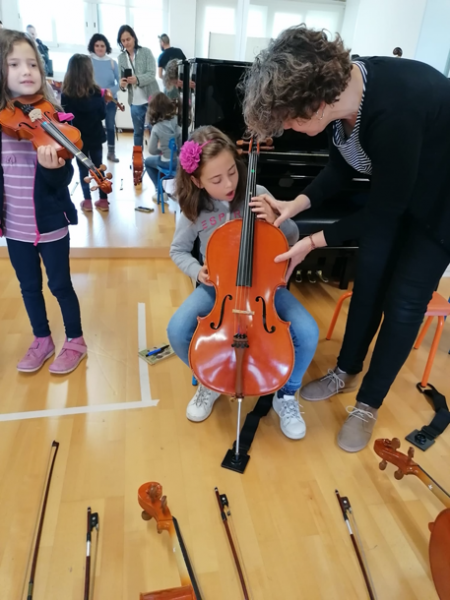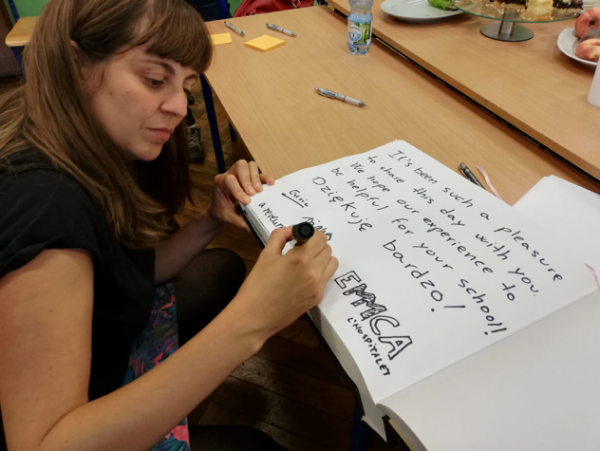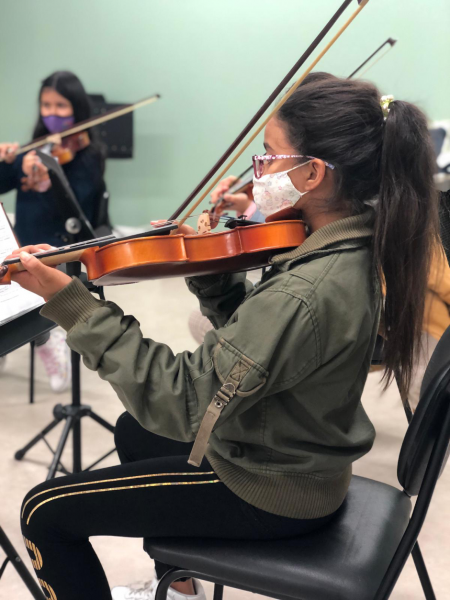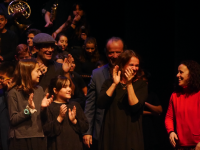An URBACT OnStage transfer story by L'Hospitalet de Llobregat's Diana Franov, EMMCA teacher and Ausiàs March School orchestra project coordinator, and Enric Aragonès, EMMCA teacher and pedagogical coordinator.
FOREWORD
EMMCA is the Music School and Arts Centre of L’Hospitalet (Barcelona), the Lead Partner of ONSTAGE: Music Schools for Social Change - but EMMCA is way more than this. EMMCA is a huge family, an artistic and educational community made up of more than 2,500 students, their families, 60 professionals and a diverse range of allies in the city and beyond.
ONSTAGE has been an amazing opportunity for EMMCA to improve both its model and practice and to share that knowledge with enthusiasm. In other words, to be proud and to be even prouder every day.
This story attempts to explain our European adventure in four photographs, four moments, four memories. We hope, Dear reader, this will resonate with you.

I
WE LEARN
Emma has her first hands on experience with the cello. It’s the beginning of a whole new adventure in EMMCA.
Learning experience: to perceive a new idea and incorporate it to our mental schemes until it is completely assimilated. It is a complex process that can happen within seconds or last a lifetime. We learn on our own and with the people around us. We learn from the others and from ourselves. We learn to learn and along the way we lose some data, giving space to the very significant stuff to our brain.
Every teacher and professor experience the fascinating payback in the pedagogical performance. Every time we explain something in a classroom we cause a pedagogical action back to ourselves. This goes in a double direction: the more we teach, the more we learn what we are teaching, and at the same time the more we learn to teach. We learn content and we learn to shape it out.
If we copy this idea into a school level we find the same evidence. To explain EMMCA's model makes us understand it better and perceive most its significance into a city context.
Taking on the leadership of the URBACT transfer network prompted fresh thought and direction for EMMCA - a determination to strengthen both our practice and our outreach within the community. This process required a two-year improvement plan, the core objective of which was to increase engagement between the school and the population of L’Hospitalet. In order to achieve this goal we considered three levels of good practice: policy-making, operational skills and social innovation and engagement. Within these we focused on three elements:
- Extending our offer to new population groups, including children aged 0-3, young people and those living with mental health issues.
- Improving our projects in primary schools.
- Commissioning a research study on the impact of EMMCA within the community.

II
WE SHARE
During the two days we spent at Katowice presenting our project, we found the enthusiasm of the local teachers to be the most rewarding gift
Our aim at EMMCA is to achieve social cohesion via artistic education programmes that engage with all. We've therefore endeavoured to create a learning environment which is a true reflection of L’Hospitalet and its social variety. Ordinary arts practice and arts training programmes are usually out of reach for entire social sectors that remain excluded from them. Our objective is inclusion and uptake for all, not just for one homogenous group or income bracket. Our proudest achievement is that the people who visit our arts centre every week to play, sing, dance, rehearse and learn come from all backgrounds and origins. This can only be explained by a wide and complex range of devices coordinated for this aim, including a social worker involved in the communication with the families and a number of integrated activities involving primary school students with EMMCA students together.
Our city understood that the use of arts and culture as a means of social unity and connection was not widespread and decided to initiate a 'transfer network' with other cities in Europe. The goal was not simply to export our model, but rather to grow, develop and learn from one another, using our collective knowledge and experience to achieve social change.
We have found that the process of transferring our good practice via an international network has forced us to strengthen our own local networks. All perspectives and voices have to be considered in our analysis and improvement of our work. Contact and visits to other institutions, transnational meetings and teachers’ trips have given us a fresh understanding of our work. For example, teachers from L’Hospitalet visited Katowice in order to share our knowledge of primary school projects so that local teachers could consider this when creating new initiatives in their city. In doing so, we found ourselves reflecting, reimagining and innovating our roles and projects at EMMCA.
To share is a way to reevaluate and improve.

III
WE IMPROVE
Arts practice is a development factor in several scopes -personal, social, educational
Roshelys is a 9 years old girl who began attending viola lessons at her primary school two years ago. Since 2010, every child in this school -as well as in other local schools- plays a string instrument and rehearses with an orchestra every week. Roshelys learnt rapidly and communicated how much she was enjoying the experience with her classmates. They play together and perform before an audience several times a year, not only at school but in a variety of different settings. Roshelys was advised that she could extend her learning and attend extracurricular lessons at EMMCA’s main venue. She convinced her mother to let her do so. Whilst at EMMCA she not only met children from different schools with similar string projects (and realised that there was a huge community involved), but she was also able to connect with other children from backgrounds that have traditionally had access to the arts.
Inside these classes students from all over the city share their education and grow together.
To increase the impact of EMMCA’s activity in primary schools and to strengthen the existing bonds between centres is a challenging goal. It’s a goal that will not only provide better artistic education to the students, but will be of significance to the whole community. We have listened to every individual in this process - teachers, music teachers, directors, social workers, families etc and we have listed a number of steps we can implement - not only inside the classroom, but outside of it. Actions we can share with other subjects, activities we can plan together, teaching skills we can learn from each other and improved communication and visibility.
There are two other improvements that EMMCA is working on that go hand in hand with this approach. Firstly, the extension of our provision to groups other than primary school children (babies, toddlers, youth, those with mental health conditions) in order that EMMCA can better reflect the social composition of L’Hospitalet. Secondly, the instigation of an external impact assessment of our work by ESMUC, the Catalan College of Music.

IV
WE PERFORM
After the show, after the performance, applause and evaluation.
It is a moment to reflect and look back upon this adventure. We are a team of music, drama and dance teachers who dared to apply to a European programme for urban policies, usually the domain of experts in international projects. Applying for a programme that did not focus specifically on arts education could have been a hindrance. Instead it encouraged us to focus on a broader concept, that of public service. All those involved have an enhanced awareness that EMMCA is not only a music, drama and dance school, but a public service for the dissemination of cultural, educational and social policy. A tool for integrated, sustainable and equitable growth.
The improvement achieved, both in our several projects and in the commitment of all concerned, must now last. We have strengthened as a team and EMMCA has consolidated its centrality in local government.
In the end, all the steps taken, all the dedicated work, will only make sense if they enable us to better achieve our mission: to make more and more people practice and engage in the arts, to overcome the barriers of social and cultural exclusion and make arts and culture a space of cohesion and encounter.
We are committed to do this - and more ready than ever.
Diana Franov, EMMCA teacher and Ausiàs March School orchestra project coordinator
Enric Aragonès, EMMCA teacher and pedagogical coordinator.
______________________________
